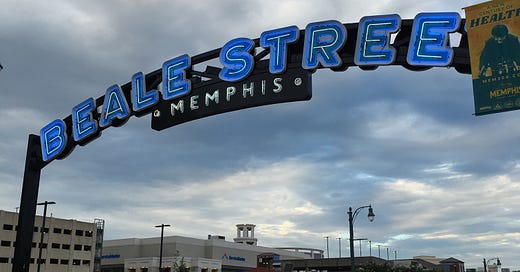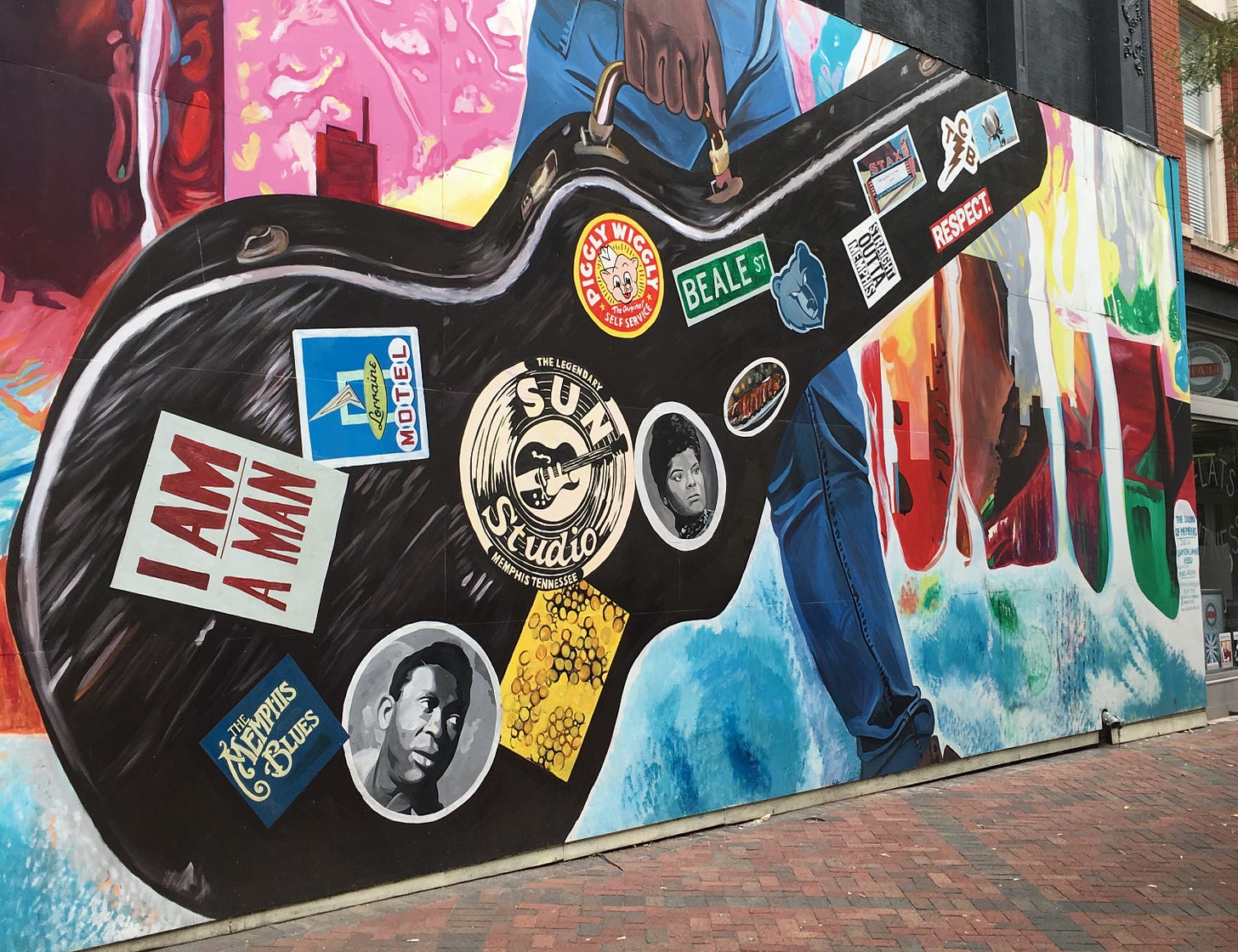Walkin' in Memphis (But Not West Virginia)
"Many cities make music, but no city breathes music quite like Memphis. The songs and sounds that come from here are uniquely American." – Shawn Amos
Bitter pop-punk bands who always crave pizza aside, most Americans love their hometowns.
Maybe the country’s relatively short history is why belonging is so important in the US. They love their high schools, and their colleges for that matter, and they love their Irish heritage on their great great great grandaddy’s side. [I’ll have more on the idea of being Irish-ish in a future post.]
But, perhaps most of all, they love their proverbial hometowns.
Eric Church wants you to give his back. Bruce Springsteen’s old man told him to take a good look around his. Half of Kelsea Ballerini’s is still hanging around talking about that one touchdown.
During technical difficulties at a Grand Ole Opry show I once witnessed a stressed out and mic’d up runner rattle off a list of states after asking “where y’all from?” Each place was met with a chorus of “yeah”s, “woo”s and “yee haw”s, as appropriate. This went on for eleven minutes.
In 30+ years of living in the UK I have never heard, and can confidently say that I will never hear, the words “yeah, Scunthorpe rules!” or “woo, Worcestershire!” uttered aloud at any event.
And, other than a few odes to London – think Warren Zevon’s Werewolves of… and Gerry Rafferty’s Baker Street – we don’t do a ton in the way of paying homage to places in music either.
Americans do.
From Sweet Home Alabama to CVB’s History of Utah, there’s (at least) one song named for every US state. Understandable, because there are so many rhymes sitting right there; put an acoustic guitar behind something about the nitty gritty down in ol’ Mississippi and you’ve got a hit.
But, of course, there’s more to it than just that.
In his Grammy-nominated hit, for which this post is named, Marc Cohn describes walking with his feet “ten feet off of Beale.” For the, mostly Black, teenagers who backflip their way down the street for tips today, this lyric is taken quite literally.
Hampton Sides – author, historian and Memphis native – said this about the city:
It's pleasingly off-kilter. It's a great big whack job of a city. The anti-Atlanta. You go there, and you can't believe the things people will say, the way they think, the wobbling orbits of their lives. There's an essential otherness.
Walking in Memphis is an enduring hit because of Cohn’s ability, one all great songwriters have, to key into this otherness. And, when he momentarily forsakes his Jewish faith to become “a Christian son” in the Hollywood Café (actually in nearby Robinsville, Mississippi), he uses his own outsider status to tell a story that couldn’t be about anywhere other than where it is.
For a more modern spin on this, the fantastic Nashville-formed LANY contrast their Southern roots with new California lives in the sublime cowboy in LA.
Figuring out what makes a place tick is something that Americans do incredibly well and I believe that’s, at least in part, because they measure them against the yardstick of their beloved hometown.
Then again, there are always exceptions to the rule.
When he first performed Take Me Home, Country Roads, John Denver had never been to West Virginia. The song was actually conceived by its writers on a trip through rural Maryland, but there weren’t enough syllables in the Old Line State’s name to make it fit.
For whatever reason, what might be perceived as a lack of authenticity didn’t hurt in this case.
Co-writer Bill Danoff toyed with the refrain “Almost heaven, Massachussetts” before settling on WV instead. He used encyclopaedia entries about the Mountain State to round out the song, which is now one of West Virginia’s four official state anthems. Go figure.
Without Memphis there would be no Elvis Presley.
You could also make a case that without Elvis Presley, there would be no Memphis: close to one million of Memphis’ ~12 million annual visitors make a pilgrimage to Graceland.
Technically speaking, Tupelo, Mississippi is Elvis's hometown. It’s where he was born and lived until the age of 13, and was regarded by some as a “trashy” kid who played “hillbilly music.”
But it was in Memphis that Elvis started making trips to Beale Street, where he fell in love with blues music and the gaudy clothing in the window of Lansky Brothers. It’s also where, some time before their respective ascents, he hung out with a young B.B. King. Two young Kings on Beale.
Sam Philips of Sun Records once said the following:
If I could find a white man who had the Negro sound and the Negro feel, I could make a billion dollars.
Philips found what he was looking for in Presley. And, well, you know how the rest went.
I’m hardly an Elvis superfan but, when I stood by his grave at Graceland in 2019, tears started running down my face. It’s hard to say why I was so overcome with emotion, standing there listening to a tinny rendition of Love Me Tender through self-guided tour headphones.
I didn’t know then that it was the last time I’d get out to America for, provided my next trip goes ahead as planned, almost three years. But I could tell that there was something special about the moment. The way music, place, and time came together was as close as I’ve ever felt to magic.
Presley famously told Marion Keisker, receptionist at Sun Records that:
I sing all kinds. I don’t sound like nobody.
That statement wasn’t quite true. He sounded, even if he didn’t know it, like Memphis.
Maybe you believe that Elvis respectfully borrowed from, and paid homage to, leading Black musicians of the time. Maybe you believe that he outright appropriated their sound. Either way, his success is all down to Memphis and it’s why Presley ultimately became an icon.
It’s also why country music sounds better coming from a gravelly cowboy with a Marlboro hanging from his lips than a bro in boots who rose to fame on America’s Got Talent. Because when a place gets under your skin, in your blood, you can’t help but show its influence in everything you do.
And you can fake a lot of things, but that’s one thing you can’t.
Unless, perhaps, you’re singing about West Virginia’s country roads.








I love “Walking in Memphis”. Grew up listening to that and you’re right, it does endure. Interesting to hear some history and make connections to the song and music in general. Well done.